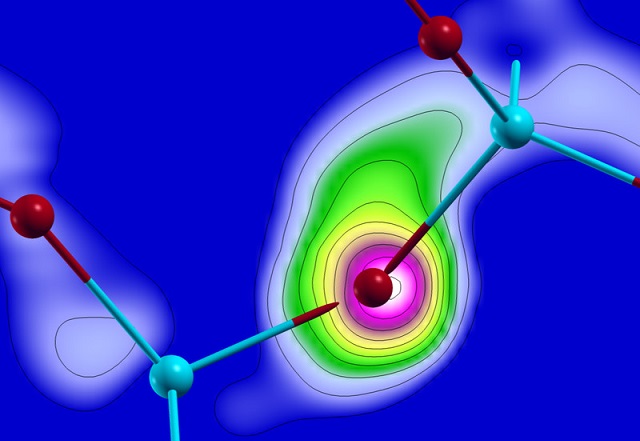
Computer simulations show the electron flux from one atom to the others.
Image courtesy: TU Wien
Quartz glass, irradiated by a laser pulse, becomes a metal for a very short span of time (femtoseconds) and returns to its original state immediately afterwards. This phenomenon has now been explained by Vienna University of Technology (TU Wien) scientists in partnership with Tsukuba University researchers with the help of large-scale computer simulations.
According to quantum mechanical principles, an electron in a solid material is capable of occupying various states. At a high energy state, an electron can move freely between atoms.
Georg Wachter, one of the researchers, said that besides transferring energy, the entire pattern of attainable electron states in the quartz glass is completely modified by the laser pulse.
As a result, an electron that is normally attached to an oxygen atom in the quartz glass is exchanged to another atom, thereby resembling a free electron as in the case of a metal.
Following this separation, the electrons are driven towards one direction by the electric field of the pulse, causing the flow of an electric current. The electrical conduction can be sustained for a while by applying extremely strong laser pulses.
Joachim Burgdörfer of TU Wien said that simulating these phenomena is a challenging task as several quantum processes need to be considered at the same time.
Supercomputers have been used to calculate the electronic structure of the quartz glass, electron-electron interactions, and the laser-electron interaction.
The researchers have studied the time evolution in slow motion using the computer simulations to explore the changes in the material, he added.
When a material is illuminated the laser pulse, its properties are changed due to the ionization of atoms and the modification of the electronic structure.
In this case, the current flow is a thousand folds faster when compared to transistors which work on a picosecond time scale.
The computer simulations demonstrate that the ultra-fast current is greatly influenced by the chemical bonds and crystal structure of the quartz glass.
The researchers will perform experiments on different materials in order to find the way of using this phenomenon more efficiently.